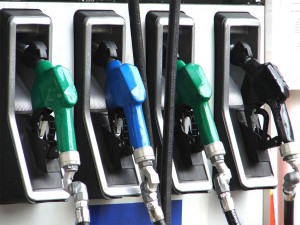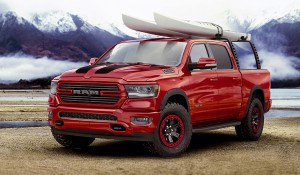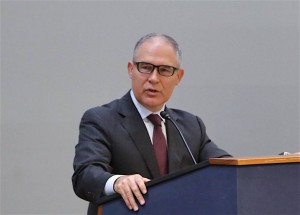
The auto industry is waiting anxiously to see if and how the Trump Administration rewrites the current Corporate Average Fuel Economy mandate.
The Environmental Protection Agency is expected to announce revisions to federal mileage rules by April 1, but while a number of automakers are hoping to see a sharp cutback in the standards a new study finds key automotive suppliers hoping the Trump Administration will let the rules stand as they are, ramping up to 54.5 miles per gallon by 2025.
After completing a mandated mid-term review just before leaving office, the Obama Administration decided to maintain that target. But soon after President Donald Trump entered the White House, his EPA chief Scott Pruitt said he would revisit the Corporate Average Fuel Economy mandate, appearing to side with auto industry critics who complained CAFE was set to price many buyers out of the new car market.
The debate has led to an unusual split between automakers like Ford and General Motors, who want to roll back the rules, and a number of auto suppliers who support the 54.5 mpg target, according to several reports, including a new study by CALSTART, a California-based consortium aimed at developing clean transportation technologies.
Echoing the results of a 2016 supplier study, “We found that suppliers strongly support the standards and are encouraging the administration to stay the course,” CALSTART President John Boesel told TheDetroitBureau.com. “They felt (the 54.5 mpg target for 2025) was feasible and do-able.”
The study, conducted in February, polled officials from 25 “major” automotive suppliers, said Boesel, though he declined to name those involved citing confidentiality agreements.
Of that group, the study indicates the overwhelming majority felt the current rules should not be adjusted. And despite claims by carmakers like Ford and GM that CAFE threatens to raise vehicle prices and reduce sales, CALSTART’s study found 84% of the suppliers believe that stricter mileage rules actually will encourage the creation of new automotive jobs.
And 95% said more ambitious mileage standards encourage innovation and investment in the U.S. economy.
“The key point is that suppliers representing two-thirds of U.S. automotive jobs are not only bullish on high-efficiency technology but believe that if we want to create jobs in the auto sector we should be encouraging the development of that technology,” said Boesel, adding that, “This would be the wrong time to be rolling back the standards if the end goal is job creation and job protection.”
The results of the study fall in line with the views of a new consortium of suppliers, emission-control companies and advanced material manufacturers who, early this month called for the White House to let CAFE stand as is.
“We want all the regulators to work together (on) clear and stable long-term policy direction that creates market opportunities for our companies to develop and deploy advanced-vehicle technologies that will help achieve the nation’s energy and environmental goals,” said Chris Miller, executive director of the Advanced Engine Systems Institute.

Suppliers told CALSTART there are big opportunities for mild hybrid systems like the one Ram is adding to the new 1500 pickup.
The AESI is forming a new, pro-CAFE consortium in partnership with the Motor & Equipment Manufacturers Association, the Aluminum Association and the Manufacturers of Emission Controls Association. The new alliance did accept the idea that “minor tweaks and adjustments” may be needed, but not a wholesale tear-up of the mandate enacted under the Obama Administration.
(For more on that new industry consortium, Click Here.)
In the CALSTART study, suppliers warned automakers not to ease off on their fuel economy improvement efforts, 83% agreeing with the statement, “companies that are leaders in vehicle efficiency technology will be leaders more successful over the next 10-15 years.”
If anything, the study found suppliers asking the administration to start laying out plans to push beyond the 2025 timeframe covered by the current CAFE mandate and set goals reaching even further into the future. That echoes what members of the newly formed Automotive Technology Leadership Group is demanding.
While many key automakers are hoping to relax CAFE, several have indicated they will continue along their current path whatever the White House decides. That includes both Nissan and Honda. Several other manufacturers have indicated any reduction in mileage targets would only allow them to adjust their product mix to sell more of the less fuel-efficient SUVs and pickups that are the U.S. market’s current best-sellers.

There was also significant interest in technology like the new Mazda SkyActiv-X blending benefits of diesel and gas engines.
In fact, several companies pushing for a CAFE rollback have also announced plans to increase their electrified vehicle fleets, notably including GM and Ford. The bigger of the two plans to launch two more all-electric models by early 2019 and have about two dozen in its fleet the same year the current mileage rules would reach 54.5 mpg.
A number of automakers now promise to electrify most and, in some cases, even all of their products in the coming years, including Volvo and Nissan’s Infiniti brand.
(EPA’s Pruitt lets high-polluting diesels slide through regulatory loophole. Click Here for the story.)
The CALSTART study asked suppliers what technologies they see as contributing the most in the run-up to 2025. The top choices were turbocharging, downsizing and mild-hybrid systems. Those were closely followed by electrically-assisted boost technologies, CVT transmissions and new internal combustion engine designs, such as the new Mazda SkyActiv-X system, that combine the best features of diesel and gas powertrains.
In the years to follow, however, the suppliers ranked pure battery-electric drive as the lead technology, followed by plug-ins and mild-hybrids and then conventional hybrid systems.
(California wants 5 million zero emission vehicles on roads by 2030. Click Here for the story.)


Well, that’s a no-brainer. Is the next survey going to ask the oil companies if they favor EVs?
Lines like, “declined to name those involved citing confidentiality agreements” usually cause me to question the legitimacy of the statements being made. GM and Ford (and Honda and Nissan) don’t seem to have a problem with being named…
Kevin,
The amount of information that comes from OEs, either through execs or PR folks who wish to keep themselves unnamed, or even to avoid naming the companies specifically, is significant. And when you talk about suppliers directly contradicting their customers that is even more understandable.
Paul E.